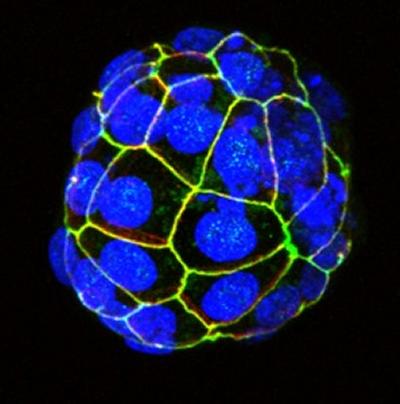Breast cancer cells’ sugar craving is target for new type of treatment
A new way to target a breast cancer cells’ appetite for over-indulging in sugar, that could provide an alternative treatment for chemotherapy resistant breast cancer, is being developed by Breast Cancer Campaign scientists at the University of Southampton.
The treatment exploits a novel link, identified by the scientists, between sugar processing in the cells and their growth and division.
This approach to treating breast cancer offers a real alternative to chemotherapy as it targets the active cancer cells and not normal cells, reducing the risk of side effects that affect thousands of women undergoing treatment.
Breast Cancer Campaign funded scientist, Dr Jeremy Blaydes at the University of Southampton, has shown for the first time that chemicals called cyclic peptide inhibitors can stop ‘sweet toothed' cancer cells from growing and multiplying by blocking proteins in the cells called CtBPs (C-terminal binding proteins).
A key feature of cancer cells is they gorge on sugar from the blood, greedily processing it as a fuel supply which triggers CtBPs to bind together, forming pairs known as dimers that enable cells to grow and multiply out of control.
In unique laboratory experiments, Dr Jeremy Blaydes and colleagues developed a number of chemicals designed to block CtBP dimers from forming. They then selected the most effective chemical, CP61, which they are now developing in the lab for use as a breast cancer treatment.
Dr Blaydes comments: "Because this is an entirely new approach to treatment, the drugs we are developing could be effective against breast cancers that have become resistant to current chemotherapies. Unfortunately, despite great improvements in breast cancer treatment in recent years, chemotherapy-resistance eventually happens in around one in five cases (20 per cent), and every year in the UK around 12,000 women still die from the disease. To overcome this resistance, innovative treatments that use new approaches to stop cancer from growing are desperately needed.
"What makes this discovery even more exciting as a potential treatment is that CtBPs are mostly only active in the cancer cells, so blocking this ‘sweet tooth' should cause less damage to normal cells and fewer side effects than existing treatments.
"This work is at an early stage in the laboratory but it is really exciting as it has the potential to deliver a completely new kind of cancer drug, which could be available within 10 years."
Dr Stuart Griffiths, Director of Research at Breast Cancer Campaign, adds: "For women whose breast cancer has become resistant to chemotherapy, this potential new treatment could offer a much needed life line.
"In 2003 Dr Blaydes' pioneering CtBP research was identified by Breast Cancer Campaign as a project with huge potential to save and improve lives. Continuous investment in this research has brought us to the brink of a potential new treatment for people who desperately need an alternative to chemotherapy in order to increase their chance of survival.
"Every year, thousands of women still die and millions are affected by breast cancer so we will continue to seek out world-class research, bringing the brightest minds together to share knowledge and produce better, quicker results. Because we passionately believe we owe it to every woman affected by this disease to explore every avenue to overcome and outlive breast cancer - in our lifetime."
This project was partly funded through Breast Cancer Campaign's partnership with Asda and it's Tickled Pink campaign, Debenhams Think Pink campaign and The Generations Walk.
The findings were published in the August issue of Chemical Science.

Registration now open:
"Reproductive Biology - from gametes to systems, and between generations"
Event and programme details are available here. Email ifls@soton.ac.uk to register a place.
Notes for editors
1. Link to paper: http://pubs.rsc.org/en/content/articlepdf/2013/sc/c3sc50481f Reference: Birts C. et al (2013). A cyclic peptide inhibitor of C-terminal binding protein dimerization links metabolism with mitotic fidelity in breast cancer cells. Chemical Science. 4, 3046-3057
2. Breast Cancer Campaign funds innovative breast cancer research to improve diagnosis and treatment for women with breast cancer and ultimately find a cure. Breast Cancer Campaign aims to beat breast cancer by funding innovative world-class research to understand how breast cancer develops, leading to improved diagnosis, treatment, prevention and cure. The Breast Cancer Campaign Tissue Bank, the UK's first ever national breast cancer tissue bank is a unique collaboration with four leading research institutions to create a vital resource of breast cancer tissue for researchers across the UK and Ireland. Visit breastcancertissuebank.org The charity is currently funding 86 research grants throughout the UK and Ireland worth more than£15.5 million at 34 centres of excellence. Breast cancer is the most common cancer in the UK and accounts for nearly one in three of all cancers in women. In the UK, around 50,000 new cases of breast cancer are diagnosed each year - that's 130 a day. Visit breastcancercampaign.org or follow us at twitter.com/bccampaign
3. The University of Southampton is a leading UK teaching and research institution with a global reputation for leading-edge research and scholarship across a wide range of subjects in engineering, science, social sciences, health and humanities.